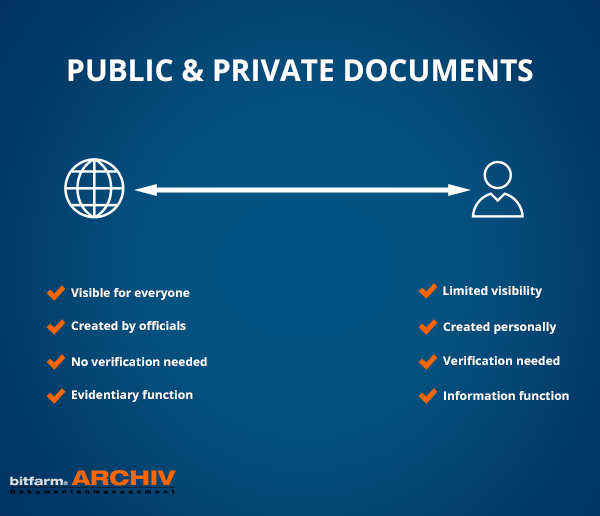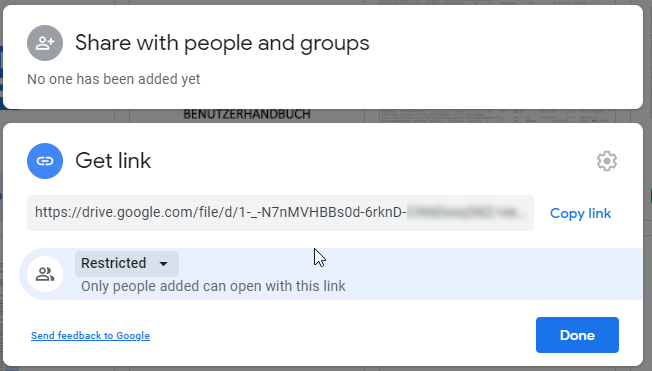Public and Private Documents: Definition, Difference & Disposal
Public and private documents: Definitions
What is a private document?
Private documents are kept out of the public and can only be viewed in camera only by certain persons. These usually contain sensitive information which need to be protected. Examples here are notes, diaries, postcards or your social security number. But business documents also fall into this category. In this case, only the two business partners should have access to the document. Among others, contracts, invoices or offers are to be mentioned here.
Since these records do not come from public authorities, they must be verified if needed. For example, a notary can be consulted or the signature of the author can be verified. Whether business or personal records are present, they should be securely archived if important informations are included.
What is a public document?
A public document is one that is issued by a government official in the course of his or her duties, within the scope of his or her authority, and in conformity with legal requirements. With the exception of those records that are expressly reserved by law, any public document may be consulted by anybody. Public records have evidential value of themselves, without the necessity for the opposing party to acknowledge them. As long as the contrary is not shown through a false accusation, the public document is believed to be genuine.
It is not enough for it be a movable object in order to achieve the legal effects for which it was created. It must also meet the legal system's requirements for each type. Due to the unique assurances that must be followed for its creation, the public document is without a doubt the fundamental foundation of the legal traffic's security. And, though the legitimate instrument has been credited with a variety of purposes in the past, the most essential and intriguing is its evidentiary function. In addition, one distinguishes between other types of public documents:
-
Judicial documents
-
Administrative or official documents
-
Notary documents
Difference between public document and private document
The major difference between public and private documents is that the former is visible to anybody, who demands an insight. Furthermore, it involves either a public official, whilst the latter only involves private individuals. Any public document may, in general, be consulted by anybody, with the exception of those that are reserved by specific legislative provision.
A private document, on the other hand, by its very nature cannot be made public unless an authority specifically authorizes it.
When a private document is presented to a notary, it may be referred to a connotation or clarification of terms beforehand. Private documents brought to a notary become public papers because of the official's intervention.
A document is legitimate when the person who drew it up, handwrote it, signed it, or the person to whom the document is attributed is known.
Public and private papers originating from the parties or third parties, whether in original or certified copies, are deemed legitimate as long as they are not tainted as false or unknown.

How to dispose of private documents?
Before disposing of private documents, consider whether important information will be lost in the process. For some business purposes, there are retention periods, and even personal documents such as rental agreements may not be disposed of within a certain period of time. If there is no retention period, they should be securely destroyed.
This can ensure that criminals cannot recover the papers. These often pursue the goal of data theft and identity theft. A paper shredder or service is suitable for physical destruction, while a document management system is the more secure and modern solution. Here, no paper has to be destroyed, but can be archived for an unlimited period of time without taking up storage space. Are you interested in more information around the topic of document management? We gladly invite you to our YouTube video series (please enable english subtitles).
Fully Functional✓ No Trial✓ Since 2003✓
How to make Google Drive private?
A question that is often asked in the same context: How can I make Google Drive files private? After selecting the document in question, the "Get Link" button must be selected for this purpose. If the new window contains the note "No one has been added yet", the document has already been set to private and is only visible to you.
If you want to share it with others, you have to send the link to the recipient so that he has access. Alternatively, they can add the person as an editor using their Google account. By default, however, no other user is created, so their files are automatically private as well.

Do you want to expand your document management? We invite you to use our free document management system, which offers almost all the same and many more features compared to Drive.
Glossary index | Home | Software | Services | Document Management | FAQ | Contact
